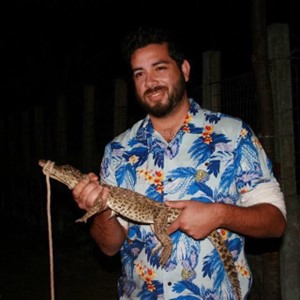Raimundo Espinoza Chirinos

Raimundo Espinoza Chirinos
Raimundo Espinoza Chirinos is the Founder and Executive Director of Conservación ConCiencia, an organization dedicated to environmental and conservation research, sustainable development, and collaboration. He has extensive knowledge of coral reef conservation and management and helped establish The Nature Conservancy’s Cuba program and its operations in Puerto Rico. He sits on the National Oceanic and Atmospheric Administration’s Marine Fisheries Advisory Committee.
Raimundo Espinoza Chirinos is a naturalized U.S. Citizen from Quito, Ecuador, where he was born and raised. He is the son of Peruvian immigrants who left for Ecuador searching for better opportunities for their family. Growing up in Ecuador gave Espinoza rich experiences that would later guide his career. During his youth, he would go on solo camping trips with his friends to the Pasochoa Wildlife Refuge, where Andean Condors flew above them, and Tapirs would push their tents over. On school trips, he visited the Galapagos Islands, white water rafting in the Amazon, hiking in forests, and spending time on the beach. At the time, he did not recognize these activities as nature-based but rather as a part of life. However, these experiences helped shape his interests, and he ultimately chose to pursue a career in conservation, where nature could be in his life every day.
Espinoza attended Pace University for his Bachelor of Arts in Environmental Studies and obtained his Master’s in Sustainable Development and Conservation Biology from the University of Maryland. Espinoza is fluent in English and Spanish and conversational in Portuguese.
Espinoza’s conservation and community engagement expertise earned him NOAA’s Coral Reef Management Fellowship in Puerto Rico, where he served as a fellow from 2008 to 2010. Espinoza worked for The Nature Conservancy (TNC), where he founded the organization’s Cuba program and served as Director. He helped facilitate the historic government-to-government action between the U.S. and Cuba at Everglades National Park in Florida. His knowledge regarding coral reef conservation and management also led to the establishment of TNC’s programming in Puerto Rico. He began working with sharks in Puerto Rico in 2013 after commercial fishers requested his help managing the shark fishery.
In 2016, Espinoza founded Conservación ConCiencia, leading a visit to Cuba with Puerto Rican fishers to learn about fishing practices and conservation. He also began the Puerto Rico Shark Research Conservation Program, the first shark research program in Puerto Rico. Conservación ConCiencia is a U.S. and Puerto Rico non-profit seeking to promote sustainable development through community engagement and research. Following Hurricane Maria in 2017, Espinoza partnered with local fishers to help clean up pollution and debris in the oceans caused by the hurricane. They dove to collect illegal fish traps that leeched pollution into the fish people ate and damaged local fish populations.
In 2018, Espinoza and Conservación ConCiencia received a grant from NOAA to support their research on the vastly unknown shark populations in Puerto Rico. Conservación ConCiencia is also financially supported by The Ocean Foundation.
In addition to his role as Director, Espinoza contributed to the U.S. Caribbean Fisheries Management Council, serving on their Outreach and Education Advisory Panel and the Puerto Rico District Advisory Panel. Espinosa sits on the National Oceanic and Atmospheric Administration’s (NOAA) Marine Fisheries Advisory Committee (NOAA). He collaborates with commercial fishers to identify where sharks live and tag them for tracking and research.
Espinoza’s career has been highly impactful, and his contributions have been well recognized. In 2022, he was named one of the 100 most influential Latinos committed to climate activism, communications, environmental rights, sustainable policies, science, and corporate impact. Other career highlights include creating Puerto Rico’s first Marine Conservation agreement with the commercial fishing sector to collaborate on marine resource conservation and sustainable, responsible seafood harvest and promotion. Key to accomplishing this project was earning the trust and cooperation of the conservation sector and small-scale commercial fishing communities. Moreover, he is proud to have facilitated one of the first official Cuban government delegation visits to the United States for a learning exchange with U.S. government agencies. The visit was hosted at the Everglades National Park, and diplomacy was promoted through conservation and natural resource management.
Espinoza has had several mentors throughout his career that have helped him. At Pace University, Professor George Martinez taught political science in a way that captivated Espinoza. Professor Betty Torrance was another mentor during his education who allowed him to be a student and student aid in her Costa Rica culture and language course. Both of these professors “had a profound impact on everything [he has] done professionally since arriving at Pace” (2023). In addition, Professor Robert Chapman helped break down conservation and environmentalism from the utilitarian to the deontological.
Moreover, Professor Ghassan Karam helped provide Espinoza’s academic foundation to continue his career with an open mind. Professor Karam also introduced him to ecological economics, which was a primary driver of why he pursued his graduate degree at the University of Maryland. At Maryland, Professors David Inouye, Jim Dietz, Doug Gill, Herman Daly, and Tom Hilde were mentors who provided critically important guidance that helped him realize his strengths. He states that he has been “fortunate to have had many folks that have helped [him] continue to develop professionally” (2023).
Finally, Dr. Robert Huerter supported Espinoza in the development of the Puerto Rico Shark Research Conservation Program.
In speaking to the advice he would give to young professionals, he encourages them to “enjoy [their] time without being complacent and explore the diversity of their interests” (2023).
About Us. Conservación ConCiencia. (n.d.). Retrieved November 2023 from https://www.Conservación conciencia.org/about_us
Survey and interviews conducted by Justice, Equity, Diversity, and Sustainability Initiative staff. 2022-2023. Yale University-School of the Environment. New Haven, Connecticut.
Márquez, Melissa Cristina. July 18, 2021. Shark Week continues in Puerto Rico. Forbes. https://www.forbes.com/sites/melissacristinamarquez/2021/07/18/shark-week-continues-in-puerto-rico/?sh=61cb168d380a
Eulich, Whitney. April 9, 2018. After Hurricane Maria, he’s helping the oceans – and its fishers- recover. The Christian Science Monitor. https://www.csmonitor.com/World/Making-a-difference/2018/0409/After-hurr…